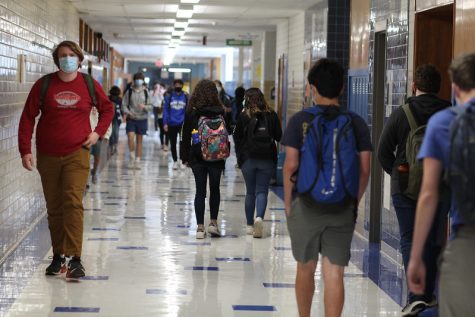TEA requires in-person STAAR
After being cancelled in 2020, test returns despite COVID-19 concerns of students, parents, politicians
Students, parents, and teachers march at the 2017 Save Texas Schools rally, fighting for the distribution of more resources to public schooling, including the end of the STAAR test. “The legislature must provide more funding to our schools and must reform the system so that school funding reflects the true costs of educating our children,” state Sen. Kirk Watson said.
March 31, 2021
The Texas Education Agency announced recently that this year’s STAAR End of Course tests will not be canceled and will instead be held in-person. Virtual learners can opt-out of the test, but even though elementary and middle school students will not be required to pass the tests to advance to the next grade level, by state law high school seniors must have still passed all their EOCs—English I, English II, Biology, Algebra I and United States History—to graduate.
Texas Tribune interview, Mike Morath, the Texas Education Commissioner, explained that TEA’s reasoning to continue the STAAR tests was rooted in thinking ahead.
“The STAAR test is designed to tell us if kids have learned the grade-level content and skills that we expect that they need to know in that subject. That is all the test does, no more, no less,” Morath said. “Our expectations can’t change for what kids need to learn because life’s expectations for our kids have not changed.”

Usually, Texas school districts use STAAR testing data to gauge how well their students are being taught, but districts will not be able to access the data this year. Districts will also not be graded based on the results of their students.
“It remains critical that parents, educators and policymakers have assessment data to understand the impact of the pandemic on student learning,” TEA stated in a Jan. 20 press release.
Safety regarding COVID-19 is a major concern for families faced with taking the test this year. While precautions will be taken at the school-wide level, in-person STAAR testing would disrupt the quarantines of the millions of students currently attending school remotely in order to limit exposure to themselves and their households. Because of these concerns, TEA has recently announced that students learning remotely can postpone their STAAR tests this year.
TEA has outlined measures that school districts can take for those who will be testing.
According to a TEA statement, “Districts should use other flexibility (e.g., extended windows) to ensure that this impacts the minimum number of students possible. Districts should have a communication plan in place to encourage as many students who are normally remote as possible to participate in the assessment.”
To maintain social distancing, they have allowed “alternative testing sites” such as performing arts centers, recreational centers and hotels to give students more space. An online version of the STAAR test that could be taken from home is not being considered.
“Most administrations for the 2020–2021 school year have been extended to give districts more flexibility in scheduling assessments and more opportunity to test all eligible students,” the TEA statement reads. “Districts should continue to follow appropriate public health protocols during any administration.”
School districts can also apply for an extended testing window that would enable schools to distribute the amount of students on campus for testing across a greater number of dates, as well as a waiver that would force in-person students to attend school remotely on testing days.
Many people, particularly Texas Democrats, have never believed that STAAR tests accurately measure school performance and should not determine whether or not students can graduate. They claim that forcing students to take them this year is even more unnecessary than normal. Schools are also concerned about the amount of asynchronous learning days they might have to have to accommodate a higher number of testing windows.
“It’s meant to compare schools for accountability purposes,” Texas Representative Gina Hinojosa tweeted. “It’s not appropriate to give at this time.”
McCallum Junior Jewel New agrees. She lives with her grandparents and does not feel comfortable putting them at risk to take the test.
Their decision last year to cancel the tests was a much better decision,” New said. “Just because a lot of time has passed doesn’t mean we’re safe. Vaccines are being rolled out but most teenagers aren’t getting them, so it’s not a smart decision. I will definitely opt out if I can.”
A large number of students, like New, who were freshmen or sophomores last year, don’t yet have the required STAAR credits to graduate.
The freshmen, sophomores and juniors who still need to secure the required credits can wait until December to test, but while staying home is technically an option, passing requirements have not been waived. Seniors who have not taken the tests, as well as students who will need multiple attempts to pass may have no other option than to go in-person if they want to graduate on time




